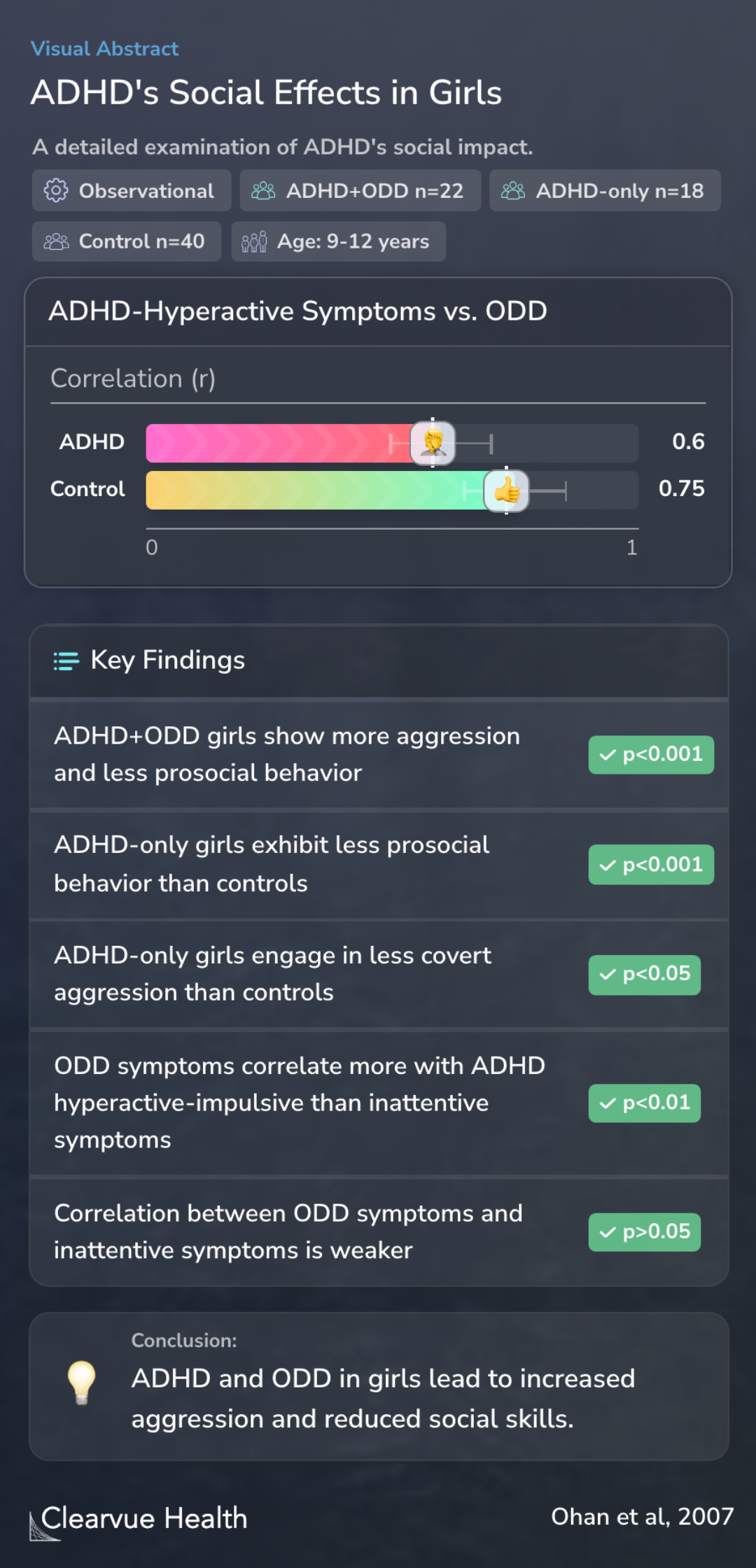What is the social impact of ADHD in girls? A multi-method assessment
ADHD's Social Effects in Girls
Ohan JL, Johnston C

Objectives
The study focuses on understanding how Attention Deficit Hyperactivity Disorder (ADHD), both on its own and when combined with opposition-defiant behavior (ODD), affects the social interactions of girls aged 9 to 12 years old. This comparison involves examining the behaviors of girls diagnosed with ADHD, those diagnosed with both ADHD and ODD, and a control group of girls without ADHD.
This study explores the social impact of ADHD, with and without opposition-defiant behaviour (ADHD+ODD (n= 22) and ADHD-only (n= 18)), in 9- to 12- year old girls compared to girls without ADHD (n= 40).
Methods
The investigation involved having the girls participate in a computer game designed to simulate social interactions while their mothers and teachers provided insights through various rating scales. This approach was chosen to observe the girls' social behaviors in a controlled yet engaging environment.
Girls played a computer game involving simulated players, and mothers and teachers completed rating scales.
Results
The findings from the study highlight a distinct pattern in social behaviors among the groups. Girls with ADHD and ODD displayed more aggressive behaviors and were less likely to engage in positive social interactions, known as prosocial behaviors, compared to girls with only ADHD. The latter group, while still showing more aggression than the control group, engaged in less covert or hidden forms of aggression and were noted for their socially awkward interactions during the computer game.
These observations suggest a correlation between hyperactive symptoms of ADHD and ODD behaviors, indicating a complex interplay between these conditions and their impact on social interactions.
In general, mothers and teachers saw girls with ADHD+ODD as more overtly and relationally aggressive and less prosocial than girls with ADHD-only, who were seen as more overtly and relationally aggressive and less prosocial than control girls. On the computer game, girls with ADHD+ODD we...
Conclusions
In summary, the study reveals that ADHD, particularly when combined with ODD, can significantly influence the social dynamics of young girls, leading to more aggressive behaviors and fewer positive social interactions. This underscores the importance of tailored interventions that address not only the symptoms of ADHD but also the potential for accompanying behavioral issues like ODD.
In all, the results indicate that girls with ADHD, with and without ODD behaviour, engage in socially detrimental behaviours.
Key Takeaways
Context
Previous studies have established a link between ADHD and challenges in social skills, suggesting long-term consequences for affected individuals. For instance, research by Harpin et al. in 2016 revealed that untreated ADHD could lead to poorer self-esteem and social functionality over time, though treatment could mitigate these effects. This emphasizes the critical role of early and sustained treatment plans in improving the social outcomes for individuals with ADHD.
Moreover, a study by Abikoff et al. in 2004 explored the combined effect of ADHD medication and multimodal psychosocial treatment on social functioning in children. The findings indicated that while social skills training did not significantly enhance social capabilities, ADHD medication alone might suffice in improving social interactions among children with ADHD. This suggests that effective management of ADHD symptoms through medication could play a key role in enhancing social engagement and skills.